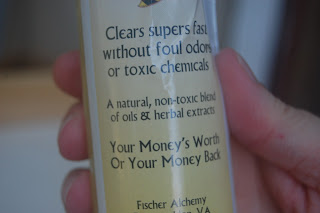By Hannah 8-9-12
What do Aristotle and Winnie the Pooh have in common? Both recognize the importance of the honey bee. Many farmers raise honey bees to help increase pollination of their plants. Along with better pollination comes -drum roll please- HONEY.
 The afternoon was fading away slowly, with only a few hours of sunlight left. As we thought over all the things we'd been saving to do on just such an afternoon like this, our minds drifted to one of our favorite times of year: harvesting the honey. While we go about it a little differently than the king of “hunny,” we end up with the same delicious results!
The afternoon was fading away slowly, with only a few hours of sunlight left. As we thought over all the things we'd been saving to do on just such an afternoon like this, our minds drifted to one of our favorite times of year: harvesting the honey. While we go about it a little differently than the king of “hunny,” we end up with the same delicious results!
We started by gathering and washing all of our supplies; these supplies included our honey spinner, our strainers, our wax knife, and several 5 gallon buckets. Other supplies included several plastic containers and our all natural bee repellent. Then the fun began.
Daddy and Patience dressed in bee helmets and long sleeves to help protect themselves. Before they approached the beehives, they started a fire in our smoker. (Bee keepers use smoke to distract the bees. When the worker bees smell the smoke they automatically assume that their hive is in danger, so they start eating all the honey they can hold.)Then Momma, being very brave without a bee suit, sprayed a board with our repellent. Since the bees don't like the cherry-almond scent of the repellent, they clear out of the honey super pretty quickly, leaving all of the capped honey comb behind.
Then it was up to Daddy to remove the honey frames. Each box, or super, is filled with nine frames, each of which is filled with probably twenty pounds of honey. To make a long story and a lot of math short, they're pretty heavy.
The the rest of us stepped in. We used our hot knife to melt the wax capping, and loaded each frame into the spinner. The honey spinner uses centrifugal force to spin the honey onto the walls of the drum. We each take turns spinning the spinner. Although this is considered the fun part of the entire process, it DOES take a good bit of elbow grease to get it done, and the next day you WILL be sore.
Then comes straining. We use three different strainer sizes to ensure that no wax ends up in our final jar of honey. That's where we are now...
All of this sounds like a lot of work (and believe me it is). So WHY do we love this time so much? The time and work and sweat that this job requires is made well worth it because of its reward. That reward is FRESH HONEY. You've never really tasted good honey until you've tasted it warm while squeezing it with your tongue right out of the comb. A few times I began to feel like Winnie the Pooh while cutting comb from the frames to jar and keep as comb honey.
Overall we got a good bit of honey and, despite all of the hard work, I think it was well worth it!
.JPG)


.JPG)